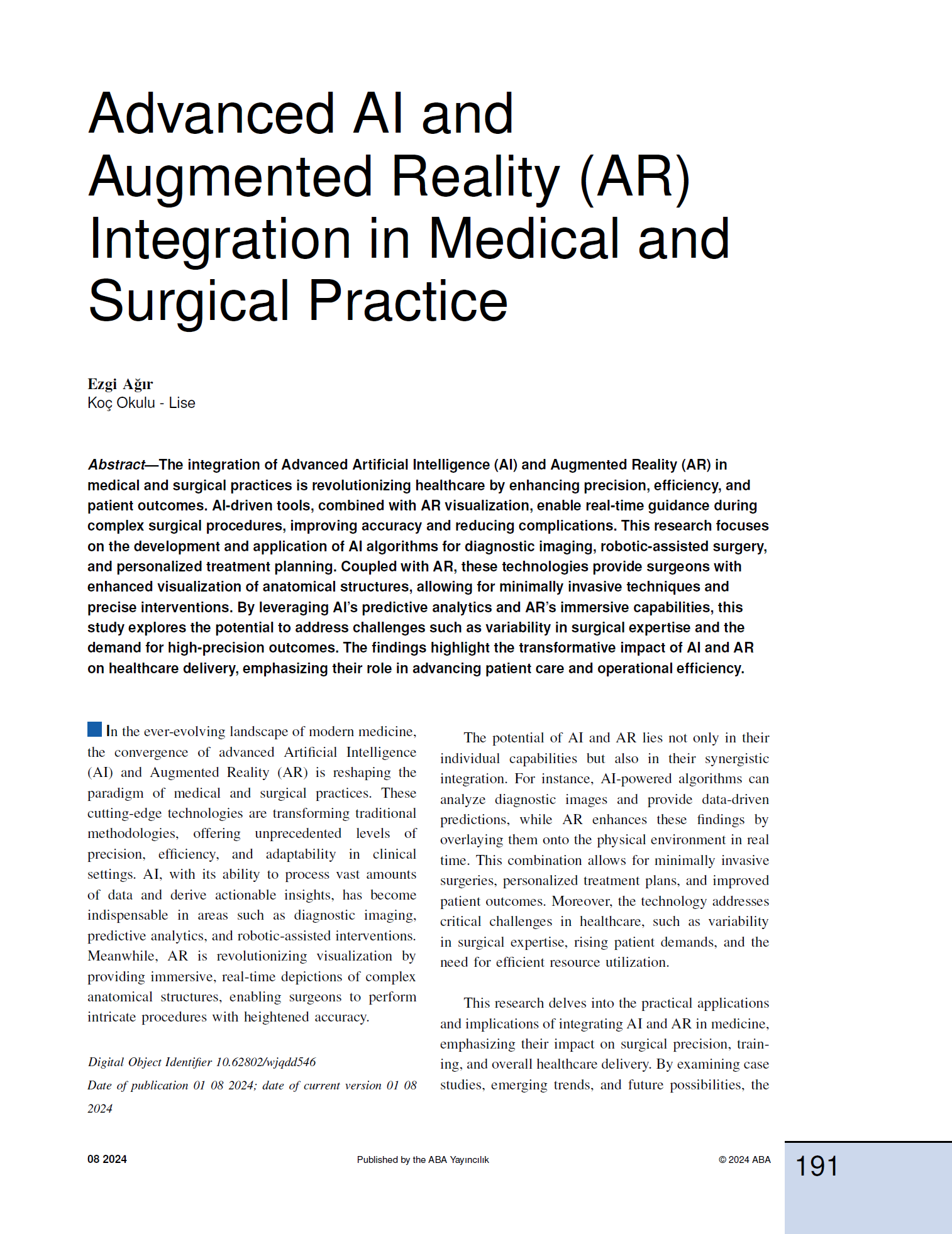Advanced AI and Augmented Reality (AR) Integration in Medical and Surgical Practice
DOI:
https://doi.org/10.62802/vhzwwb94Keywords:
Artificial Intelligence, Augmented Reality, Medical Innovation, Surgical Precision, Healthcare Technology, Robotic-Assisted Surgery, Real-Time Visualization, Personalized MedicineAbstract
The integration of Advanced Artificial Intelligence (AI) and Augmented Reality (AR) in medical and surgical practices is revolutionizing healthcare by enhancing precision, efficiency, and patient outcomes. AI-driven tools, combined with AR visualization, enable real-time guidance during complex surgical procedures, improving accuracy and reducing complications. This research focuses on the development and application of AI algorithms for diagnostic imaging, robotic-assisted surgery, and personalized treatment planning. Coupled with AR, these technologies provide surgeons with enhanced visualization of anatomical structures, allowing for minimally invasive techniques and precise interventions. By leveraging AI's predictive analytics and AR's immersive capabilities, this study explores the potential to address challenges such as variability in surgical expertise and the demand for high-precision outcomes. The findings highlight the transformative impact of AI and AR on healthcare delivery, emphasizing their role in advancing patient care and operational efficiency.References
Akpan, E. E. (2024). Healthcare Applications of Augmented Reality. Creating Immersive Learning Experiences Through Virtual Reality (VR), 201.
Al Balushi, J. S. G., Al Jabri, M. I. A., Palarimath, S., Maran, P., Thenmozhi, K., & Balakumar, C. (2024, June). Incorporating Artificial Intelligence Powered Immersive Realities to Improve Learning using Virtual Reality (VR) and Augmented Reality (AR) Technology. In 2024 3rd International Conference on Applied Artificial Intelligence and Computing (ICAAIC) (pp. 760-765). IEEE.
Battineni, G., Chintalapudi, N., Ricci, G., Ruocco, C., & Amenta, F. (2024). Exploring the integration of artificial intelligence (AI) and augmented reality (AR) in maritime medicine. Artificial Intelligence Review, 57(4), 100.
De Jesus Encarnacion Ramirez, M., Chmutin, G., Nurmukhametov, R., Soto, G. R., Kannan, S., Piavchenko, G., ... & Montemurro, N. (2024). Integrating augmented reality in spine surgery: redefining precision with new technologies. Brain Sciences, 14(7), 645.
Huang, K., Liao, J., He, J., Lai, S., Peng, Y., Deng, Q., ... & Zhao, S. (2024). A real-time augmented reality system integrated with artificial intelligence for skin tumor surgery: experimental study and case series. International Journal of Surgery, 110(6), 3294-3306.
Lastrucci, A., Wandael, Y., Barra, A., Ricci, R., Maccioni, G., Pirrera, A., & Giansanti, D. (2024). Exploring Augmented Reality Integration in Diagnostic Imaging: Myth or Reality?. Diagnostics, 14(13), 1333.
Moldovanu, C. G. (2024). Virtual and augmented reality systems and three-dimensional printing of the renal model—novel trends to guide preoperative planning for renal cancer. Asian Journal of Urology.
Roosan, D. (2024). Integrating Artificial Intelligence with Mixed Reality to Optimize Health Care in the Metaverse. In Augmented and Virtual Reality in the Metaverse (pp. 247-264). Cham: Springer Nature Switzerland.
Saudagar, A. K. J., Kumar, A., & Khan, M. B. (2024). Mediverse Beyond Boundaries: A Comprehensive Analysis of AR and VR Integration in Medical Education for Diverse Abilities. Journal of Disability Research, 3(1), 20230066.
Singh, B., Vig, K., & Kaunert, C. (2024). Modernizing Healthcare: Application of Augmented Reality and Virtual Reality in Clinical Practice and Medical Education. In Modern Technology in Healthcare and Medical Education: Blockchain, IoT, AR, and VR (pp. 1-21). IGI Global.









